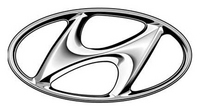Hyundai Leads Pack in Standardizing ESC
Electronic Stability Control is Standard Safety Equipment on 70 Percent of Hyundai Vehicles, More Than Any Other Popular Brand
Fountain Valley, Calif. (June 14, 2006) - Hyundai continues to demonstrate its commitment to life-saving Electronic Stability Control (ESC) by making it standard on more of its sales volume than any luxury brand. Hyundai expects to sell more than 350,000 ESC-equipped vehicles in the 2007 model year - more than Audi, BMW, Infiniti, Lexus, Mercedes-Benz, Porsche or Volvo.
Proving that ESC does not require paying premium prices, Hyundai offers this sophisticated safety technology as standard equipment on five vehicle lines for the 2007 model year: Sonata, Tucson, Santa Fe, Entourage, and Azera - all of which have starting prices between $18,000 and $25,000. All told, 70 percent of Hyundai sales volume in the 2007 model year will be comprised of vehicles with standard Electronic Stability Control, a higher standard fitment rate by far than that achieved by any non-luxury brand, including Toyota, Honda, Ford, Chevrolet or VW.
"Research universally substantiates that Electronic Stability Control is an invaluable life-saving technology, and Hyundai is proud to lead all popular automotive brands in providing it as standard equipment to our customers," said John Krafcik, vice president of product development and strategic planning, Hyundai Motor America. "Other manufacturers may talk about their commitment to this technology, but at Hyundai, we've demonstrated our commitment by making ESC standard equipment on 70 percent of our volume."
A study released earlier this week by the Insurance Institute for Highway Safety (IIHS) confirmed that ESC reduces the risk of all single-vehicle crashes by more than 40 percent - fatal crashes by 56 percent. In addition, the same research shows that ESC reduces the risk of fatal multiple-vehicle crashes by 32 percent. The IIHS data also shows that ESC reduces the risk of single-vehicle crashes by SUVs by 43 percent and cars by 33 percent, while it reduces single-vehicle rollovers by SUVs by 80 percent, 77 percent for cars. The IIHS estimates that as many as 10,000 fatal accidents could be avoided each year if all vehicles were equipped with ESC.
"Rarely do we see safety effects as large as we're seeing for Electronic Stability Control," said Adrian Lund, president, Insurance Institute for Highway Safety. "We encourage all vehicle manufacturers to include this important technology on new models because the research proves it saves lives."
Hyundai Motor America launched a new initiative in June to inform consumers of the important life-saving technology found as standard equipment on 70 percent of Hyundai vehicles. All Hyundai vehicles equipped with standard ESC will be tagged with a small window decal which reads "ESC: Life-saving technology confirmed by NHTSA and IIHS studies." This effort is intended to help raise awareness for ESC, while underlining Hyundai's dedication to providing this sophisticated technology as standard equipment on the vast majority of its models.
Electronic Stability Control is just one element of Hyundai's commitment to unsurpassed safety, which includes a wide range of active safety equipment to help drivers avoid accidents, and passive equipment to protect all vehicle occupants if an accident can't be avoided.
Electronic Stability Control uses sophisticated electronic and hydraulic technologies to help stabilize situations where a driver finds the vehicle veering from its appropriate path - due to slippery surfaces, driver distraction or other causes. In a University of Michigan study released earlier this month, Electronic Stability Control reduced the chance of an SUV being in a fatal accident by 50 percent, while reducing the chance of a fatal rollover by 73 percent. For cars, the system reduced the chance of a fatal accident by 31 percent and the chance of a fatal rollover by 40 percent. message.txt Study author John Woodrooffe noted that Electronic Stability Control systems "appear to be the most significant safety advance since seat belts."
Additionally, a National Highway and Traffic Safety Administration (NHTSA) study reports a 35 percent reduction in single vehicle crashes for passenger cars, and a 30 percent reduction in fatal single vehicle crashes in cars equipped with ESC. For SUVs, the numbers are even higher, with a 67 percent reduction in single vehicle crashes for SUVs and a 63 percent reduction in fatalities.
Accelerating the industry's adoption rate of ESC, five Hyundai models now come with the safety technology as standard equipment. The 2005 Tucson SUV became the first Hyundai model to feature ESC as standard equipment upon its launch in fall 2004. It was also the first vehicle under $20,000 with standard ESC and six airbags. The completely redesigned 2006 Sonata mid-size sedan was the first mid-size sedan under $20,000 with standard ESC and six airbags when it launched in spring 2005. The premium Azera large sedan debuted in fall 2005 with standard ESC and eight standard airbags. This year, Hyundai's first-ever minivan, Entourage, debuted with ESC, six standard air bags, and a Gold Top Safety Pick award from the Insurance Institute for Highway Safety - the highest safety rating ever awarded a minivan. And this June, Hyundai's all-new 2007 Santa Fe mid-size crossover debuts with standard ESC, six airbags, and a starting price below the outgoing model, rounding out Hyundai's suite of vehicles equipped with standard ESC, and accounting for 70 percent of 2007 model year sales volume.
Hyundai Motor America, headquartered in Fountain Valley, Calif. is a subsidiary of Hyundai Motor Company of Korea. Hyundai cars and sport utility vehicles are distributed throughout the United States by Hyundai Motor America and are sold and serviced by more than 700 Hyundai dealerships nationwide.
________________________________
message.txt University of Michigan study conducted by John Woodrooffe, released May 10, 2006
NHTSA's Light Vehicle ESC Research Program, June 9, 2005, Dr. W. Riley Garrott, Garrick J. Forkenbrock; National Highway Traffic Safety Administration Vehicle Research and Test Center



